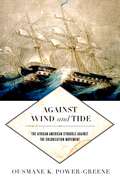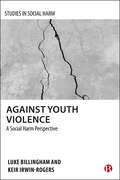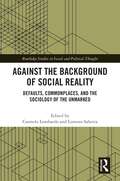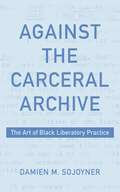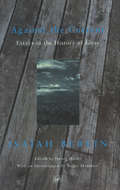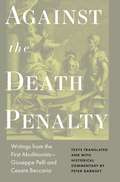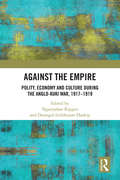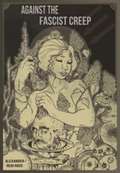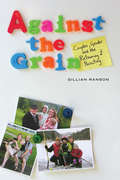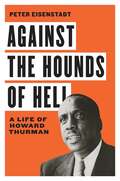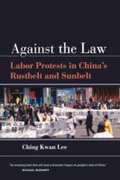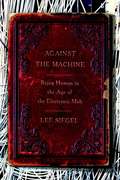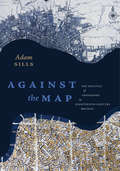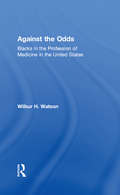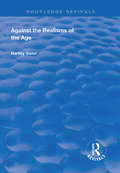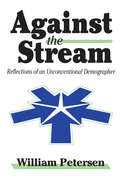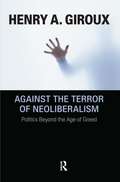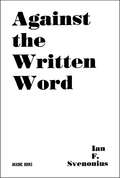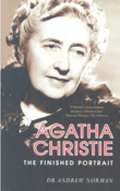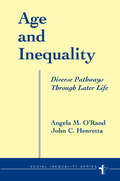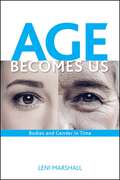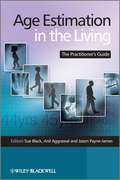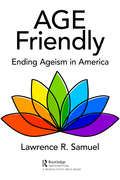- Table View
- List View
Against Wind and Tide: The African American Struggle against the Colonization Movement (Early American Places #10)
by Ousmane K. Power-GreeneAgainst Wind and Tide tells the story of African American’s battle against the American Colonization Society (ACS), founded in 1816 with the intention to return free blacks to its colony Liberia. Although ACS members considered free black colonization in Africa a benevolent enterprise, most black leaders rejected the ACS, fearing that the organization sought forced removal. As Ousmane K. Power-Greene’s story shows, these African American anticolonizationists did not believe Liberia would ever be a true “black American homeland.”In this study of anticolonization agitation, Power-Greene draws on newspapers, meeting minutes, and letters to explore the concerted effort on the part of nineteenth century black activists, community leaders, and spokespersons to challenge the American Colonization Society’s attempt to make colonization of free blacks federal policy. The ACS insisted the plan embodied empowerment. The United States, they argued, would never accept free blacks as citizens, and the only solution to the status of free blacks was to create an autonomous nation that would fundamentally reject racism at its core. But the activists and reformers on the opposite side believed that the colonization movement was itself deeply racist and in fact one of the greatest obstacles for African Americans to gain citizenship in the United States.Power-Greene synthesizes debates about colonization and emigration, situating this complex and enduring issue into an ever broader conversation about nation building and identity formation in the Atlantic world.
Against Youth Violence: A Social Harm Perspective (Studies in Social Harm)
by Luke Billingham Keir Irwin-RogersAvailable open access digitally under a CC-BY-NC-ND licence. For many children and young people, Britain is a harmful society in which to grow up. This book contextualizes the violence that occurs between a small number of young people within a wider perspective on social harm. Aimed at academics, youth workers and policy makers, the book presents a new way to make sense of this pressing social problem. The authors also propose measures to substantially improve the lives of Britain’s young people in areas ranging from the early years to youth services and the criminal justice system.
Against the Background of Social Reality: Defaults, Commonplaces, and the Sociology of the Unmarked (Routledge Studies in Social and Political Thought)
by Lorenzo Sabetta Carmelo LombardoThe first wide-ranging, organic analysis of the sociology of unmarkedness and taken-for-grantedness, this volume investigates the asymmetry between how we attend to the culturally emphasized features of social reality and ignore the culturally unmarked ones. Concerned with the structures of cultural invisibility, unconscious rules of irrelevance, automatic frames of meaning, and collective attention patterns, it brings together scholarship spanning sociology, anthropology, and social psychology, to cover various aspects of humdrum, unglamorous, nondescript, nothing-to-write-at-home-about social phenomena, developing the key assumptions, underpinnings, and implications of this field of study.As comprehensive analysis of unremarked features of our social existence, this book will appeal to scholars across the social sciences with interests in social theory and the sociology of everyday life.
Against the Carceral Archive: The Art of Black Liberatory Practice
by Damien SojoynerAgainst the Carceral Archive is a meditation upon what author Damien M. Sojoyner calls the “carceral archival project,” offering a distillation of critical, theoretical, and activist work of prison abolitionists over the past three decades. Working from collections at the Southern California Library (Black Panthers, LA Chapter; the Coalition Against Police Abuse; Urban Policy Research Institute; Mothers Reclaiming Our Children; and the collection of geographer Clyde Woods), it builds upon theories of the archive to examine carcerality as the dominant mode of state governance over Black populations in the United States since the 1960s.Each chapter takes up an element of the carceral archive and its destabilization, destruction, and containment of Black life: its notion of the human and the production of “pejorative blackness,” the intimate connection between police and military in the protection of racial capitalism and its fossil fuel–based economy, the role of technology in counterintelligence, and counterinsurgency logics. Importantly, each chapter also emphasizes the carceral archive’s fundamental failure to destroy “Black communal logics” and radical Black forms of knowledge production, both of which contest the carceral archive and create other forms of life in its midst. Concluding with a statement on the reckoning with the radical traditions of thought and being which liberation requires, Sojoyner offers a compelling argument for how the centering of Blackness enables a structuring of the mind that refuses the violent exploitative tendencies of Western epistemological traditions as viable life-affirming practices.
Against the Current: Essays in the History of Ideas
by Isaiah BerlinBerlin's main theme in these essays is the importance in the history of ideas of dissenters whose thinking still challenges conventional wisdom - among them Machiavelli, Vico, Montesquieu, Herzen and Sorel. With his unusual powers of imaginative re-creation, he brings to life original minds that swam against the current of their times, and in the process offers a powerful defence of variety in our visions of life. Roger Hausheer's introduction surveys Berlin's whole oeuvre, and the full bibliography of his pubication has been updated for this Pimlico edition.
Against the Death Penalty: Writings from the First Abolitionists—Giuseppe Pelli and Cesare Beccaria
by Cesare Beccaria Giuseppie PelliThe first known abolitionist critique of the death penalty—here for the first time in EnglishIn 1764, a Milanese aristocrat named Cesare Beccaria created a sensation when he published On Crimes and Punishments. At its centre is a rejection of the death penalty as excessive, unnecessary, and pointless. Beccaria is deservedly regarded as the founding father of modern criminal-law reform, yet he was not the first to argue for the abolition of the death penalty. Against the Death Penalty presents the first English translation of the Florentine aristocrat Giuseppe Pelli's critique of capital punishment, written three years before Beccaria's treatise, but lost for more than two centuries in the Pelli family archives.Peter Garnsey examines the contrasting arguments of the two abolitionists, who drew from different intellectual traditions. Pelli was a devout Catholic influenced by the writings of natural jurists such as Hugo Grotius, whereas Beccaria was inspired by the French Enlightenment philosophers. While Beccaria attacked the criminal justice system as a whole, Pelli focused on the death penalty, composing a critique of considerable depth and sophistication. Garnsey explores how Beccaria's alternative penalty of forced labour, and its conceptualisation as servitude, were embraced in Britain and America, and delves into Pelli's voluminous diaries, shedding light on Pelli's intellectual development and painting a vivid portrait of an Enlightenment man of letters and of conscience.With translations of letters exchanged by the two abolitionists and selections from Beccaria's writings, Against the Death Penalty provides new insights into eighteenth-century debates about capital punishment and offers vital historical perspectives on one of the most pressing questions of our own time.
Against the Empire: Polity, Economy and Culture during the Anglo-Kuki War, 1917-1919
by Ngamjahao Kipgen Doungul Letkhojam HaokipThis book explores the Kuki uprising against the British Empire during the First World War in the northeast frontier of India (then the Assam–Burma frontier). It sheds light on how the three-year war (1917–1919), spanning over 6,000 square miles, is crucial to understanding present-day Northeast India. Companion to the seminal The Anglo-Kuki War, 1917–1919, the chapters in this volume: • Examine several aspects of the Anglo-Kuki War, which had far-reaching consequences for the indigenous Kuki population, including economy, politics, identity, indigenous culture and belief systems, and traditional institutions during and after the First World War itself; • Highlight finer themes such as the role of the chiefs and war councils, symbols of communication, indigenous interpretation of the war, remembrance, and other policies which continued to confront the Kuki communities; • Interrogate themes of colonial geopolitics, colonialism and the missionaries, state making, and the frontier dimensions of the First World War. Moving away from colonial ethnographies, the volume taps on a variety of sources – from civilisational discourse to indigenous readings of the war, from tour diaries to oral accounts – meshing together the primitive with the modern, the tribal and the settled. This book will be of great interest to scholars and researchers of South and Southeast Asian Studies, area studies, modern history, military and strategic studies, insurgency and counterinsurgency studies, tribal warfare, and politics.
Against the Fascist Creep
by Alexander Reid RossUS society is notoriously complacent when it comes to the rise of fascist tendencies. When Dylann Roof murdered nine black parishioners in a Charleston church, media emphasis remained superficial. Familiar narratives of insane lone wolves and Confederate flags masked the organizations that inspired Roof's act and their connections to politicians at the local, state, and federal levels throughout the South—groups like the Council of Conservative Citizens (formerly the White Citizens Council).Scratch the surface of such groups and you'll find a web of complex ties and front groups created by fascist ideologues. Trace the connections further and further back and you find yourself moving from semi-respectable organizations through darker and darker levels of fascism and hatred.Fascism is not a euphemism here. A terrifying tour of the history and influence of international neo-fascists, Against the Fascist Creep maps the connections and names the names, showing how infiltration is a conscious and secret program for white nationalist and neo-Nazi groups. Their activity has exploded since the economic crisis and they have stepped up efforts to influence both mainstream and radical groups, including anarchists.This book is a line in the sand that both identifies the creep of fascist messages, ideas, and organization throughout our society and outlines how to stop it in its tracks. Alexander Reid Ross is a contributing moderator of the Earth First! Newswire. He is the editor of Grabbing Back: Essays Against the Global Land Grab and a contributor to Life During Wartime: Resisting Counterinsurgency.
Against the Grain: Couples, Gender, And The Reframing Of Parenting
by Gillian RansonDrawing on findings from interviews done with 32 families living in cities across Canada, Ranson challenges dominant understandings of mothering and fathering by looking closely at how couples who have opted for less traditional divisions of labour negotiate their parental and household responsibilities. Included are interviews with breadwinner mothers and caregiver fathers, and with dual-earner couples, both heterosexual and same-sex, who struggle to share equally in the nurture and support of their families. A central claim of the book is that, to the extent that both parents are equally involved in hands-on caregiving, they tend to become, over time, functionally interchangeable and move away from "mothering" and "fathering," and toward parenting. Against the Grain offers us an excellent opportunity to examine how social change happens at the forefront of family life.
Against the Hounds of Hell: A Life of Howard Thurman (The American South Series)
by Peter EisenstadtAn inspiration to Martin Luther King Jr., James Farmer, and other leaders of the civil rights movement, Howard Thurman was a crucial figure in the advancement of African Americans in the 20th century. Until now, however, he has not received the full biographical treatment he deserves. In Against the Hounds of Hell, Thurman scholar Peter Eisenstadt offers a fascinating exploration of the life of this great religious thinker and activist. The first significant African American pacifist, Thurman was the first African American to meet Mahatma Gandhi. An early and outspoken feminist, environmentalist, and advocate for social and economic justice, he was one of the first and most insistent mid-20th century proponents of racial integration. At the same time, he was a key figure in the emergence of mysticism and "spirituality" as an alternative to formal religion. Against the Hounds of Hell will at last establish this multifaceted historical personage as a leading figure of 20th century American politics, religion, and culture.
Against the Law
by Ching Kwan LeeThis study opens a critical perspective on the slow death of socialism and the rebirth of capitalism in the world's most dynamic and populous country. Based on remarkable fieldwork and extensive interviews in Chinese textile, apparel, machinery, and household appliance factories, Against the Law finds a rising tide of labor unrest mostly hidden from the world's attention. Providing a broad political and economic analysis of this labor struggle together with fine-grained ethnographic detail, the book portrays the Chinese working class as workers' stories unfold in bankrupt state factories and global sweatshops, in crowded dormitories and remote villages, at street protests as well as in quiet disenchantment with the corrupt officialdom and the fledgling legal system.
Against the Machine: Being Human in the Age of the Electronic Mob
by Lee SiegelThe new situation doesn't represent the lack of community suddenly produced by the Internet. That is the hackneyed complaint made, again and again, by people who don't seem to have thought through the unlovely aspects of community- its smug provincialism and punitive conventionalism, its stasis and xenophobia- which was in any case jeopardized and transformed by the advent of modernity two hundred years ago. The simple fact is that sometimes you don't want the quiet conformities induced by community; sometimes you simply want to be alone, yet together with other people at the same time. The old-fashioned cafe provided a way to both share and abandon solitude, a fluid, intermediary experience that humans are always trying to create and perfect. The Internet could have been its fulfillment. But sitting absorbed in your screen world is a whole other story. You are socially and psychologically cut off from your fellow caffeine addicts, but mentally beset by e-mails, commercial pop-ups, and a million temptations that may enchant in the moment- aimed as they are at your specific and immediate interests and desires -but in retrospect are time-wasting ephemera.
Against the Map: The Politics of Geography in Eighteenth-Century Britain
by Adam SillsOver the course of the seventeenth and eighteenth centuries, the increasing accuracy and legibility of cartographic projections, the proliferation of empirically based chorographies, and the popular vogue for travel narratives served to order, package, and commodify space in a manner that was critical to the formation of a unified Britain. In tandem with such developments, however, a trenchant anti-cartographic skepticism also emerged. This critique of the map can be seen in many literary works of the period that satirize the efficacy and value of maps and highlight their ideological purposes. Against the Map argues that our understanding of the production of national space during this time must also account for these sites of resistance and opposition to hegemonic forms of geographical representation, such as the map.This study utilizes the methodologies of critical geography, as well as literary criticism and theory, to detail the conflicted and often adversarial relationship between cartographic and literary representations of the nation and its geography. While examining atlases, almanacs, itineraries, and other materials, Adam Sills focuses particularly on the construction of heterotopias in the works of John Bunyan, Aphra Behn, Jonathan Swift, Daniel Defoe, Samuel Johnson, and Jane Austen. These "other" spaces, such as neighborhood, home, and country, are not reducible to the map but have played an equally important role in the shaping of British national identity. Ultimately, Against the Map suggests that nation is forged not only in concert with the map but, just as important, against it.
Against the Odds: Blacks in the Profession of Medicine in the United States
by Wilbur Watson"Racial separatism, gender discrimination, and white dominance have historically thwarted black Americans' occupational aspirations. Access to medical education has also been limited, and mobility within the profession, leading to unequal access to health care. There have, however, been notable triumphs. In Against the Odds, Wilbur Watson describes successful efforts by determined individuals and small groups of black Americans, since the early nineteenth century, to establish a strong black presence in the medical profession. Changes in medical education and hospital management, desegregation of the medical establishment, and the contemporary challenges of managed-care organizations all attest to their achievements.Watson analyzes sociocultural, political, and psychological factors associated with African-American medical practice; race and gender differences in medical education and professional development; and doctor-patient relationships during and since the period of racial separatism. He discusses the policy implications of physicians' viewpoints on issues such as folk practitioners as health care providers, medical care for the poor, abortion and euthanasia, the Tuskegee syphilis experiments, and the emergence of managed-care organizations. Through in-depth interviews with older physicians and comparative analyses of their situated techniques of coping with racial discrimination and segregation, we gain insight into the effects of separatism on the minds, selves, and social interactions of African-American physicians. Finally, Watson outlines current ethics, demographic changes since desegregation, the contemporary status of black physicians, and recent changes in the socioeconomic organization of the profession of medicine.Against the Odds is a unique study of the history, ethnography, and social psychology of blacks in medicine. Watson successfully debunks the myth that black physicians were less competent providers than t"
Against the Realisms of the Age (Routledge Revivals)
by Heartley SlaterFirst published in 1998, Taking on Wittgensteinianism themes, but also using, or relying on several mathematical results, Slater in this book explores the idea of realism and further argues how in a philosophical viewpoint is incorrect. Slater also surveys various philosophers in the field of logic to argue against the idea of realism.
Against the Stream: Reflections of an Unconventional Demographer
by William PetersenWith the insight and clarity that mark all of Petersen's writings, Against the Stream brings together reflections of an unconventional demographer. Thirteen essays on various topics become a cohesive unit by virtue of the author's unique point of view, and the understanding of contemporary events he has gathered in his long mastery of demography is evident in this volume.In a brief introduction the author points out that the viewpoints he expresses in the volume are unorthodox. He covers a variety of topics. Chapter 1 examines utopian thought, which Petersen notes usually gets good press that, in his view, is undeserved. Chapter 2 discusses planned communities and suburbanization, beginning with two famous utopias presented in books by Edward Bellamy and Ebenezer Howard, which had significant influence on American and British societies. Chapter 3 analyzes the perennial topic of how the balance between people and their sustenance will evolve. Chapter 4 critically explores Durkheim's analysis of suicide. Chapters 5 and 6 analyze the culture, language, and geographical positions of the individual countries of Belguim and Canada, providing a fresh outlook on these routine topics. Chapters 7 and 8 evaluate rebellious Berkeley students and adolescent student rebels in general as the juvenile delinquents that they often are. Chapter 9 discusses the anti-urban bias of the mainline American Churches. Chapter 10 traces the historical roots of Christian holidays, pointing out their significant links with prior religions. Chapter 11 critically examines the history of the English language as a guide to current usage. Chapters 12 and 13 survey two widely misunderstood demographic topics the cause of death and obesity and provide some stimulating new ideas.This latest work by a distinguished demographer is a tightly knit, compact volume, a compendium of thought written in a nontechnical manner and about various subjects that will both interest the general
Against the Terror of Neoliberalism: Politics Beyond the Age of Greed
by Henry A. GirouxThe neoliberalism of Milton Friedman and Friedrich Hayek is more than an economic theory, according to Giroux (English and cultural studies, McMaster U., Canada). It must be understood (and challenged) also as a powerful public pedagogy and cultural politics. Since education and culture play prominent political and economic roles in securing consent and producing capital, cultural politics must supplement economic and institutional struggles in the fight against the social damage of neoliberalism. In order to aid this task he seeks to describe how neoliberalism works at the level of everyday life through the language of privatization and the lived cultural forms of class, race, gender, youth, and ethnicity. Annotation ©2008 Book News, Inc., Portland, OR (booknews.com)
Against the Written Word: Toward A Universal Illiteracy
by Ian F. SvenoniusIf the Gutenberg Bible is the alpha, Against the Written Word is the OMEGA. Against the Written Word is the most important, most revolutionary book produced since the advent of the printing press; the book that will liberate readers from reading, writers from writing, and booksellers from peddling their despicable wares. This book ushers in a new era of freedom from reading and all its attendant bedfellows such as Enlightenment thinking and the mass alienation wrought by the phonetic alphabet. Against the Written Word will be a tremendous best seller and simultaneously the last book that anyone will read. With nineteen essays ripping, shredding, tearing apart all the bugaboos that haunt humanity nowadays, Against the Written Word is a must-read for any aspiring radical or would-be gnostic who has a penchant for words, thought, clothes, intoxicants, music, art, expression, etc. The work is presented in a range of writing: essays, screenplays, lectures, sci-fi stories, and manifestos, with topics that include “the rise of incorporated man,” “tourism as the neoliberal mode of military occupation,” a workshop on songwriting for the purpose of suggestion and mind control, and many more. This handsome, illustrated book will correct the paucity of thought that characterizes the modern bookstore, and will practically sell itself. It will call out from the shelf to ingratiate itself to the unsuspecting everyday book browser, who will be hooked and then hungrily consume it. Infected with a wild-eyed evangelism, they will then proliferate it amongst their friends and acquaintances. These new readers will disseminate it, and so on; soon this slim, innocuous volume will define an epoch and steer thought from here on out. The bookseller will be surprised and pleased to find that it will be the only book they need to stock. Against the Written Word will be dominant in a manner the market has not seen since the Bible tore up best-seller lists in the Middle Ages or Mao’s Little Red Book wowed the critics in Red China.
Agatha Christie and the Guilty Pleasure of Poison (Crime Files)
by Sylvia A. PamboukianAgatha Christie and the Guilty Pleasure of Poison examines Christie’s female poisoners in the context of Christie’s own experience in pharmacy and of detective fiction. In doing so, it uncovers an overlooked dynamic in which female poisoners deliver well-deserved comeuppance for gendered and classed wrongdoing ordinarily accepted in everyday life. While critics have long recognized male outlaws, like Robin Hood, who use crime to oppose a corrupt system, this book contends that female outlaws – witches and poisoners – offer a similar heritage of empowered femininity. Far from cozy and formulaic, Agatha Christie’s outlaw poisoners offer readers the surprising pleasures of comeuppance, and they set the stage for contemporary detective fiction writers, more recent films depicting poisoning as empowering, and even poison gardens, which are tourist destinations that offer visitors the guilty pleasure of poison.
Agatha Christie: The Finished Portrait
by Andrew NormanWhen Agatha Christie, the so-called 'Queen of Crime', disappeared from her home in Sunningdale in Berkshire for eleven days on 3 December 1927, the whole nation held its breath. This work explains, in the light of scientific knowledge, her behaviour during that troubled time.
Age And Inequality: Diverse Pathways Through Later Life
by Angela O'RandIn the United States, older populations exhibit the highest levels of economic inequality of all age groups. Across all advanced societies, the inequalities observed in older populations stem from structural and individual processes that differentiate the life courses of women and men and yield distinctive patterns of economic inequality in adulthood and old age.Age and Inequality examines the structural and individual bases of inequality and aging in the United States, especially in recent decades. The interplay of the employment system with public and private social insurance systems operates to structure the shapes of work careers and the patterns of exit from these careers in late adulthood and old age.Gender inequality across the life course is an important element of age inequality. Labor market structure, state policies, and life course factors such as fertility and the division of household labor systematically differentiate men's and women's work careers.Aging and retirement in the twenty-first century raise concerns regarding public welfare and market policies affecting labor exits and income support systems over the next half century. Angela O'Rand and John Henretta consider the implications of the changing workplace and changing public policies for women and men.
Age Becomes Us: Bodies and Gender in Time (SUNY series in Feminist Criticism and Theory)
by Leni MarshallIn lively, accessible prose, this book expands the reach and depth of age studies. A review of age studies methods in theory, literature, and practice leads readers to see how their own intersectional identities shape their beliefs about age, aging, and old age. This study asks readers to interrogate the "texts" of menopause, self-help books on aging, and foundational age studies works. In addition to the study of these nonfiction texts, the poetry and prose of Doris Lessing, Lucille Clifton, and Louise Erdrich serve as vehicles for exploring how age relations work, including how they invoke readers into kinships of reciprocal care as othermothers, otherdaughters, and otherelders. The literary chapters examine how gifted storytellers provide enactments, portrayals, and metaphorical uses of age to create transformative potential.
Age Discrimination
by John MacnicolAge discrimination is a highly topical issue in all industrialised societies, against a background of concerns about shortening working lives and ageing populations in the future. Based upon detailed research, and adopting an interdisciplinary approach, this unique study traces the history of the age discrimination debate in Britain and the USA since the 1930s. It critically analyses the concepts of ageism in social relations and age discrimination in employment. Case-studies on generational equity and health care rationing by age are followed by an analysis of the British government's initiatives against age discrimination in employment. The book then traces the history of the debate on health status and old age, addressing the question of whether working capacity has improved sufficiently to justify calls to delay retirement and extend working lives. It concludes with a detailed examination of the origins and subsequent working of the USA's 1967 Age Discrimination in Employment Act.
Age Estimation in the Living
by Jason Payne-James Anil Aggrawal Sue BlackThis book summarizes and explains the main approaches to age estimation in the living, defining when a parameter may be of use and raising awareness of its limitations. This text ensures that practitioners recognize when an assessment is beyond their area of expertise or beyond verification depending upon the clinical data available. Each key approach to age evaluation has been allotted a single chapter, written by an international leader in the particular field. The book also includes summary chapters that relay readily accessible data for use by the practitioner, and includes important "ageing milestones."This book is indispensable where problems of immigration and legal standing, juvenile vs. adult criminal status, and responsibilities of law enforcement to protect vulnerable persons are key issues on a daily basis. Medical practitioners, forensic practitioners such as pathology, odontology, anthropology and nursing, lawyers, and police would find this book incredibly useful.
Age Friendly: Ending Ageism in America
by Lawrence R. SamuelAge Friendly: Ending Ageism in America is a rallying call to make the United States a more equitable and just nation in terms of age. "Age friendliness" means being inclusive towards older people as workers, consumers, and citizens, something that can’t be said to exist today. The United States and, especially, Big Business, are notoriously age-unfriendly places, a result of our obsession with youth. Virtually all aspects of everyday life in America will be impacted by the doubling or tripling of the number of older people over the next two decades, more reason to adopt age friendliness as a cause. Age Friendly shows how large companies are in an ideal position to address the aging of America and, in the process, benefit from making their organizations more age friendly. Because of its economic power and commitment to diversity in the workplace, Big Business—specifically the Fortune 1000—has the opportunity and responsibility to take a leadership role in changing the narrative of aging in America. The book shows that age friendliness offers the possibility of bridging gaps not just between younger and older people, but those based on income, class, race, gender, politics, and geography. More than anything else, Age Friendly presents a bold and counterintuitive idea—aging is a positive thing for businesses, individuals, and society as a whole—and we should embrace it rather than fear it. While ageism is a pervasive force in America that, like racism and gender discrimination, runs contrary to our democratic ideals, there is some good news. An age friendly movement is spreading in America and around the world as a growing number of cities and towns strive to better meet the needs of their older residents. Aa well, a concerted effort is being made to convince Big Business that an intergenerational workforce is in the best interests of not just older employees but the companies themselves. Age brings experience, perspective, and wisdom—just the right skill set for both short- and long-term decision-making. The aging of America also presents major implications for businesses in terms of marketing to older consumers. Baby boomers are still the key to the economy despite marketers’ focus on youth, much in part to their collective wealth and propensity to consume. Age friendly marketing thus makes much sense due to "the longevity economy," i.e., the billions of dollars that older consumers spend each year and the goldmine that looms in the future as they become an even bigger percentage of the population. Finally, Age Friendly discusses how more corporations are pursuing social responsibility in addition to maximizing profits—an ideal opportunity for corporations to demonstrate good citizenship by supporting age friendliness on a local, state, or national level.
